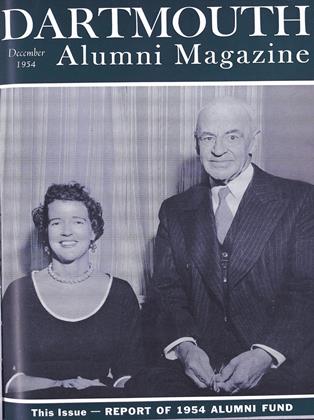WALLACE STEVENS, a Hartford insurance executive, is undoubtedly one of our finest poets. The measure of his stature as a poet may be found in TheCollected Poems of Wallace Stevens, published by Knopf in October.
He composes much of his poetry while walking, which helps him to concentrate. "My own movement," he says, "gets into the movement of the poems." He jots down his ideas as he goes along, hands his notes later to a typist, and then he pulls and tugs at the poem until he has the thing the way he wants it. Then he puts it away for a week or two until he has forgotten it. If he finds it entirely fresh when he takes it up again, if it satisfies him, then that "is the end of it."
Mr. Stevens does not use conventional rhymes and rhythms, and for the initiate he will prove difficult, but he is eminently worth effort in extending one's poetic horizons. He is now 75 years old, and has been writing poetry for forty years. His poems are exquisitely formed, and with him form and substance are indivisible.
I should think any lover of poetry would find this book a fine gift on Christmas day. Glory, God and Gold, by Paul I. Wellman, is the second volume in the Mainstream of America Series (the first being Stewart Holbrook's Age of the Moguls), and is an admirable sketch of the history of the American Southwest.
There are sections about the Spanish conquest, France's La Salle, the übiquitous Jean L'Archeveue, massacres, the travail of Texas (the Alamo, Goliad, and San Jacinto), the war between the States, and so on. Described are deeds, famous and infamous, and on the whole neither the Christian conquerors nor the white men in general have a creditable record. Horrible crimes were committed in the name of Christianity, and the record is, for the most part, "entirely discreditable on all sides, except perhaps the poor Pueblo Indians who were puzzled by the bearded fiends who came to 'pacify' and 'protect' them." Which is to say: to convert, rob, and kill them, which the Spanish did, bravely, and with incredible gusto. I am happy to say that the conquerors missed most of the gold.
Hamilton Basso's The View fromPompey's Head, has received, on the whole, most laudatory reviews. It is the story of a New York lawyer going back into his past. One finds himself first in the world of publishing and of law in Manhattan; then, and there are many flashbacks, to life in a small Southern city. I enjoyed this book, though I can not quite regard it as a major work in American fiction. It is journalistic in tone, and lacks the fire of genius. A Literary Guild choice.
Victor Reynolds '27 is a publisher (Cornell University Press) who knows his onions, and recently he sent me a most enjoyable book: The Golden Age ofHomespun. This book celebrates the traditions of the days before (and after) the Civil War when the "whir of the spindle and the thack of the loom" were heard in nearly every upstate New York farmhouse.
I am not yet quite in my dotage and many things I remember from summers spent on farms in my childhood I found described in this book. Anyone who is fascinated by our past will enjoy it. There are excellent line drawings, the type is large and readable, and my thanks to the author, Jared van Wagenen Jr., for several hours of pleasant recollection.
William Plomer's novel Museum Pieces (Noonday Press) is a pleasant interlude from much current fiction. Mr. Plomer has been writing for thirty years but is quite unknown to most American readers. Nevertheless as a serious novelist he fulfills Idris Parry's test: "The way ideas are presented must be more important than the ideas themselves; the novel should be a book that means more than it says, and this unexplained margin of suggestion can only come from form, the arrangement of words."
I can recommend without reservation this story of a mother and son who could not adjust themselves to change. It is a witty and delightful novel.
All those who enjoy nature writing will find much pleasure, I think, in Edwin Way Teale's The Wilderness World ofJohn Muir (Houghton Mifflin), which is an attempt to present in one volume the most enduring work of this great naturalist and conservationist, I think the editor did well, and he has made me want to go back and re-read Muir's My First Summerin the Sierras, A Thousand-Mile Walkto the Gulf, Our National Parks, and so on.
 View Full Issue
View Full Issue
More From This Issue
-
 Feature
FeaturePREFACE TO DARTMOUTH
December 1954 By EDWARD CONNERY LATHEM '51 -
 Feature
Feature"The Record of Their Fame"
December 1954 By FORD H. WHELDEN '25 -
 Feature
Feature"They Game from America and They Were Four"
December 1954 By PROF. HENRY B. WILLIAMS, -
 Feature
FeatureA Report on Finances
December 1954 -
 Class Notes
Class Notes1918
December 1954 By ERNEST H. EARLEY, W. CURTIS GLOVER, RICHARD P. WHITE -
 Class Notes
Class Notes1930
December 1954 By ALEX J. MCFARLAND, CHARLES V. RAYMOND, HENRY S. EMBREE,
HERBERT F. WEST '22
-
 Article
ArticleHANOVER BROWSING
February 1935 By Herbert F. West '22 -
 Books
BooksWHEN WE SKI
April 1937 By Herbert F. West '22 -
 Article
ArticleHanover Browsing
October 1939 By HERBERT F. WEST '22 -
 Article
ArticleHanover Browsing
February 1941 By HERBERT F. WEST '22 -
 Article
ArticleHanover Browsing
December 1950 By HERBERT F. WEST '22 -
 Books
BooksSPINDRIFT
November 1951 By Herbert F. West '22
Article
-
 Article
ArticleJUNIOR PROM PLAN
April, 1909 -
 Article
ArticleSecretaries Meeting Appointed
February, 1911 -
 Article
ArticleRESIGNATION OF SECRETARY KNAPP
April 1917 -
 Article
ArticleRecent criticisms by President Meiklejohn of Amherst College directed toward
April, 1922 -
 Article
ArticleFernald Bequest
May 1956 -
 Article
ArticleNumismatist
October 1979 By M.B.R.


